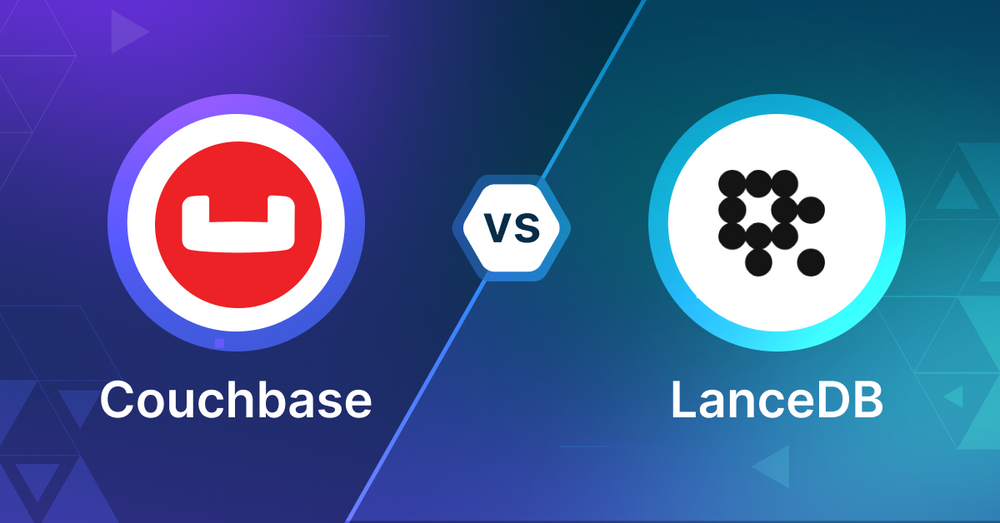Couchbase vs LanceDB: Choosing the Right Vector Database for Your AI Apps

What is a Vector Database?
Before we compare Couchbase and LanceDB, let's first explore the concept of vector databases.
A vector database is specifically designed to store and query high-dimensional vectors, which are numerical representations of unstructured data. These vectors encode complex information, such as the semantic meaning of text, the visual features of images, or product attributes. By enabling efficient similarity searches, vector databases play a pivotal role in AI applications, allowing for more advanced data analysis and retrieval.
Common use cases for vector databases include e-commerce product recommendations, content discovery platforms, anomaly detection in cybersecurity, medical image analysis, and natural language processing (NLP) tasks. They also play a crucial role in Retrieval Augmented Generation (RAG), a technique that enhances the performance of large language models (LLMs) by providing external knowledge to reduce issues like AI hallucinations.
There are many types of vector databases available in the market, including:
- Purpose-built vector databases such as Milvus, Zilliz Cloud (fully managed Milvus)
- Vector search libraries such as Faiss and Annoy.
- Lightweight vector databases such as Chroma and Milvus Lite.
- Traditional databases with vector search add-ons capable of performing small-scale vector searches.
Couchbase is distributed multi-model NoSQL document-oriented database with vector search added on and LanceDB is a serverless vector database. This post compares their vector search capabilities.
What is Couchbase? An Overview
Couchbase is a distributed, open source NoSQL database for cloud, mobile, AI and edge computing. It combines the best of relational databases with the flexibility of JSON. Couchbase also allows you to do vector search even though it doesn’t have native vector indexes. Developers can store vector embeddings—numerical representations generated by machine learning models—within Couchbase documents as part of their JSON structure. These vectors can be used in similarity search use cases such as recommendation systems or retrieval-augmented generation both based on semantic search where finding data points close to each other in a high dimensional space is important.
One way to do vector search in Couchbase is by using Full Text Search (FTS). FTS is designed for text search but can be used for vector search by converting vector data into searchable fields. For example, vectors can be tokenized into text-like data and FTS can index and search based on those tokens. This will give you approximate vector search and a way to query documents with vectors that are close in similarity.
Alternatively developers can store the raw vector embeddings in Couchbase and do the vector similarity calculations at the application level. This means retrieving documents and computing metrics such as cosine similarity or Euclidean distance between vectors to find the closest matches. This way Couchbase will be used as storage for vectors and the application will handle the math.
For more advanced use cases some developers integrate Couchbase with specialized libraries or algorithms that enable vector search. These integrations allow Couchbase to manage the document store and the external libraries will do the actual vector comparisons. This way Couchbase can still be part of a solution that does vector search.
By using these approaches Couchbase can be used for vector search functionality and be a flexible option for various AI and machine learning use cases that require similarity search.
What is LanceDB? An Overview
LanceDB is an open-source vector database for AI that stores, manages, queries and retrieves embeddings from large-scale multi-modal data. Built on Lance, an open-source columnar data format, LanceDB has easy integration, scalability and cost effectiveness. It can run embedded in existing backends, directly in client applications or as a remote serverless database so it’s versatile for many use cases.
Vector search is at the heart of LanceDB. It supports both exhaustive k-nearest neighbors (kNN) search and approximate nearest neighbor (ANN) search using an IVF_PQ index. This index divides the dataset into partitions and applies product quantization for efficient vector compression. LanceDB also has full-text search and scalar indices to boost search performance across different data types.
LanceDB supports various distance metrics for vector similarity, including Euclidean distance, cosine similarity and dot product. The database allows hybrid search combining semantic and keyword-based approaches and filtering on metadata fields. This enables developers to build complex search and recommendation systems.
The primary audience for LanceDB are developers and engineers working on AI applications, recommendation systems or search engines. Its Rust-based core and support for multiple programming languages makes it accessible to a wide range of technical users. LanceDB’s focus on ease of use, scalability and performance makes it a great tool for those dealing with large scale vector data and looking for efficient similarity search solutions.
Key Differences
Search Methodology:
LanceDB specializes in vector search, offering both exhaustive k-nearest neighbors (kNN) and approximate nearest neighbor (ANN) search using an IVF_PQ index. Couchbase, while not natively designed for vector search, can perform it through Full Text Search (FTS) or by storing raw vector embeddings for application-level calculations.
Data Handling:
Couchbase excels with JSON documents, combining relational database features with NoSQL flexibility. It handles structured, semi-structured, and unstructured data well. LanceDB focuses on managing multi-modal data and embeddings, using a columnar data format for efficient storage and retrieval of vector data.
Scalability and Performance:
Both systems offer scalability, but their approaches differ. Couchbase, as a distributed NoSQL database, is designed for horizontal scaling across clusters. LanceDB emphasizes performance for vector operations, with its IVF_PQ index optimizing large-scale vector searches.
Flexibility and Customization:
Couchbase provides flexibility in data modeling and querying, supporting SQL-like queries (N1QL) alongside NoSQL operations. LanceDB offers customization in vector search parameters and supports various distance metrics, allowing fine-tuning for specific use cases.
Integration and Ecosystem:
Couchbase has a broader ecosystem, integrating well with various data processing and analytics tools. LanceDB, being more specialized, focuses on AI and machine learning integrations, supporting multiple programming languages for easy embedding in existing applications.
Ease of Use:
LanceDB aims for simplicity in setup and use, especially for vector search operations. Couchbase may have a steeper learning curve due to its broader feature set but offers extensive documentation and community support.
Cost Considerations:
LanceDB, as an open-source tool, may have lower initial costs. Couchbase offers both open-source and enterprise editions, with potential higher costs for advanced features and support.
Security Features:
Couchbase provides comprehensive security features including encryption, authentication, and access control, catering to enterprise needs. LanceDB's security features may be less extensive, focusing more on data integrity in vector operations.
When to Choose Each
Couchbase is for large scale distributed systems that need both traditional database features and vector search. It’s for enterprise applications that need a versatile NoSQL database with strong security. Couchbase is great for projects that handle both structured and unstructured data and vector embeddings and where scalability and broad database functionality is as important as vector search.
LanceDB is for AI and machine learning projects that are primarily about efficient vector search. It’s for applications that handle large scale multi modal data and embeddings and where high performance vector operations are integrated into existing systems. LanceDB is perfect for projects where vector similarity matching is the core functionality and where performance is optimized for that specific task.
Summary
Couchbase is a versatile NoSQL database with vector search, it’s scalable and flexible. It’s for complex applications that need broad database features and vector search. LanceDB is specialized in vector operations, it’s for high performance search for AI applications and multi modal data.
Choose between Couchbase and LanceDB based on your use case, data types and performance requirements. Choose Couchbase for general purpose database with vector search add-ons and LanceDB for dedicated high performance vector search in AI applications. Evaluate your scalability needs, integration requirements and the balance between vector search efficiency and overall database functionality to choose the right technology for your project.
While this article provides an overview of Couchbase and LanceDB, it's key to evaluate these databases based on your specific use case. One tool that can assist in this process is VectorDBBench, an open-source benchmarking tool designed for comparing vector database performance. Ultimately, thorough benchmarking with specific datasets and query patterns will be essential in making an informed decision between these two powerful, yet distinct, approaches to vector search in distributed database systems.
Using Open-source VectorDBBench to Evaluate and Compare Vector Databases on Your Own
VectorDBBench is an open-source benchmarking tool designed for users who require high-performance data storage and retrieval systems, particularly vector databases. This tool allows users to test and compare the performance of different vector database systems such as Milvus and Zilliz Cloud (the managed Milvus) using their own datasets and determine the most suitable one for their use cases. Using VectorDBBench, users can make informed decisions based on the actual vector database performance rather than relying on marketing claims or anecdotal evidence.
VectorDBBench is written in Python and licensed under the MIT open-source license, meaning anyone can freely use, modify, and distribute it. The tool is actively maintained by a community of developers committed to improving its features and performance.
Download VectorDBBench from its GitHub repository to reproduce our benchmark results or obtain performance results on your own datasets.
Take a quick look at the performance of mainstream vector databases on the VectorDBBench Leaderboard.
Read the following blogs to learn more about vector database evaluation.
Further Resources about VectorDB, GenAI, and ML
- What is a Vector Database?
- What is Couchbase**? An Overview**
- What is LanceDB**? An Overview**
- Key Differences
- When to Choose Each
- Summary
- Using Open-source VectorDBBench to Evaluate and Compare Vector Databases on Your Own
- Further Resources about VectorDB, GenAI, and ML
Content
Start Free, Scale Easily
Try the fully-managed vector database built for your GenAI applications.
Try Zilliz Cloud for FreeKeep Reading

Why Context Engineering Is Becoming the Full Stack of AI Agents
Context engineering integrates knowledge, tools, and reasoning into AI agents—making them smarter, faster, and production-ready with Milvus.

Zilliz Cloud BYOC Upgrades: Bring Enterprise-Grade Security, Networking Isolation, and More
Discover how Zilliz Cloud BYOC brings enterprise-grade security, networking isolation, and infrastructure automation to vector database deployments in AWS

Top 5 AI Search Engines to Know in 2025
Discover the top AI-powered search engines of 2025, including OpenAI, Google AI, Bing, Perplexity, and Arc Search. Compare features, strengths, and limitations.
The Definitive Guide to Choosing a Vector Database
Overwhelmed by all the options? Learn key features to look for & how to evaluate with your own data. Choose with confidence.